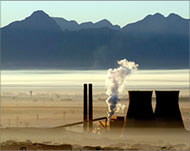The future of the world at stake
The Kyoto Treaty was nothing less than an attempt to save the human race from the prospect of destruction.

Drawn up in Japan in 1997, it committed industrialised nations to reducing greenhouse gas emissions by 5.2% below their 1990 levels.
The agreement, which Russia is balking over signing, aimed to stem global warming which experts say is wreaking havoc all over the world.
But the United States, the world’s biggest polluter, refused to ratify the treaty in 2001 saying it would have unfairly penalised the American economy.
Now only Russia can ensure Kyoto’s ratification and, many would argue, give the human race some hope for the future.
Global warming
The 1990s were the warmest decade ever recorded in the Northern Hemisphere, with freak weather conditions a regular occurence.
In May alone this year there were 562 tornadoes in the USA, resulting in 41 deaths.
And in India at least 1500 people died as a result of record summer heat waves this year, which saw temperatures reach 49C.
Extreme weather of this kind is predicted to become more common as climate change accelerates with continued warming.
 |
|
Early morning smog over Cape |
The UN Intergovernmental Panel on Climate Change said in 2001 that fossil fuels were the primary cause of global warming.
Drought and disease
It predicted the greatest impacts of warming will be on the world’s poorest people in Africa and Asia – those least able to protect themselves from rising sea levels and increased drought and disease.
By 2025 increasing drought will mean five billion people will lack sufficient water and millions more will starve, the panel said.
“The impacts of global warming are such that I have no hesitation in describing it as a ‘weapon of mass destruction’,” said Sir John Houghton, of the Intergovernmental Panel on Climate Change.
“Like terrorism this weapon knows no boundaries. It can strike anywhere, in any form – a heatwave in one place, a drought or flood or a storm surge in another. Nor is this just a problem for the future. Global warming is already upon us.”
The widespread recognition of global warming led to the Kyoto Treaty, the first concerted international effort to tackle the trend.
US refusal
The treaty needed to be ratified by countries who were responsible for at least 55% of the world’s carbon emissions in 1990 to come into force.
And although 189 countries backed it, the agreement was dealt a severe blow in March 2001 when the United States said it would never sign up.
The USA, which is responsible for 25% of carbon dioxide global emissions, argued the treaty penalised American motorists and its economy.
So a scaled-down version was drawn up four months later and finalised at climate talks in Germany in 2002.
Compromises
The revised agreement made considerable compromises including reducing cuts to be made to emissions of six gases believed to be exacerbating global warming.
But the Americans still refused to sign the treaty.
|
“Like terrorism this weapon knows no boundaries. It can strike anywhere, in any form – a heatwave in one place, a drought or flood or a storm surge in another. Nor is this just a problem for the future. Global warming is already upon us” Sir John Houghton, |
If and when the revised Kyoto protocol takes effect in 2008, it will require all signatories, including 39 industrialised countries, to achieve different emission reduction targets.
But all this will be purely academic if Russia refuses to sign the Kyoto protocol.
Condemnation
Environmental group Greenpeace has condemned the Russian president for balking over signing the treaty.
Greenpeace said in the face of mounting evidence regarding the impacts of climate change, the silence of Vladimir Putin puts the world at further risk.
“President Putin has had more than three years to analyse how Kyoto could be implemented in Russia, and his stalling could now derail the entire process,” said Greenpeace’s Steven Guilbeault.
“Russia can play a leading role in helping solve the problem of climate change or it can choose to side with George Bush.”